- New eBook additions
- NYT 100 Best Books of 21st Century.
- Young Adult Fiction
- Censorship Is So 1984. Read for Your Rights!
- Duke Classics
- Poems & Poetry
- Looking for Romance
- Bentley Investment Group (BIG) Recommended Books
- See all ebooks collections
- New Audiobook Additions
- 2025 Audie Award Winners & Nominees
- Kim's Picks For Your Commute.
- Award Winning & Nominated
- Censorship Is So 1984. Read for Your Rights!
- See all audiobooks collections
